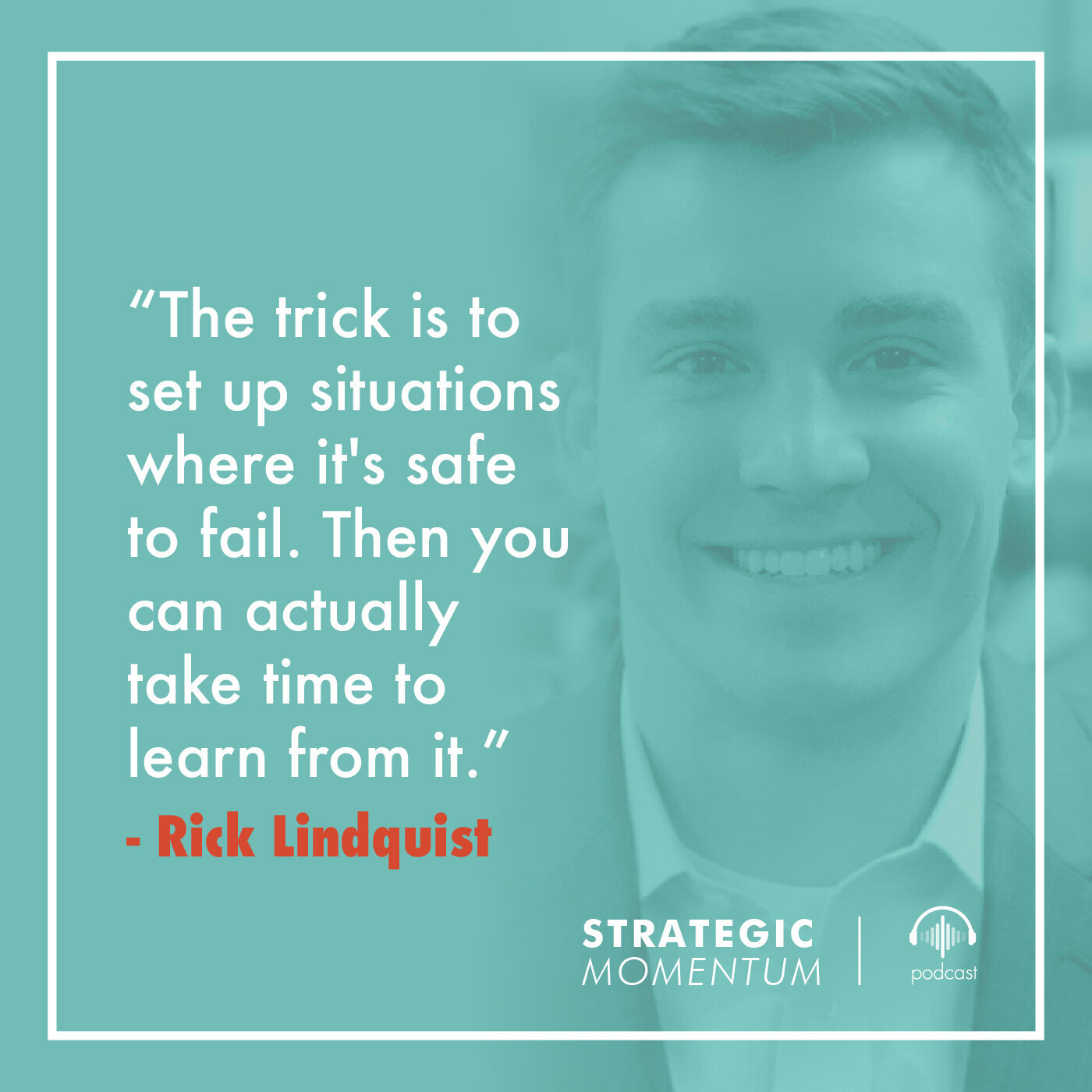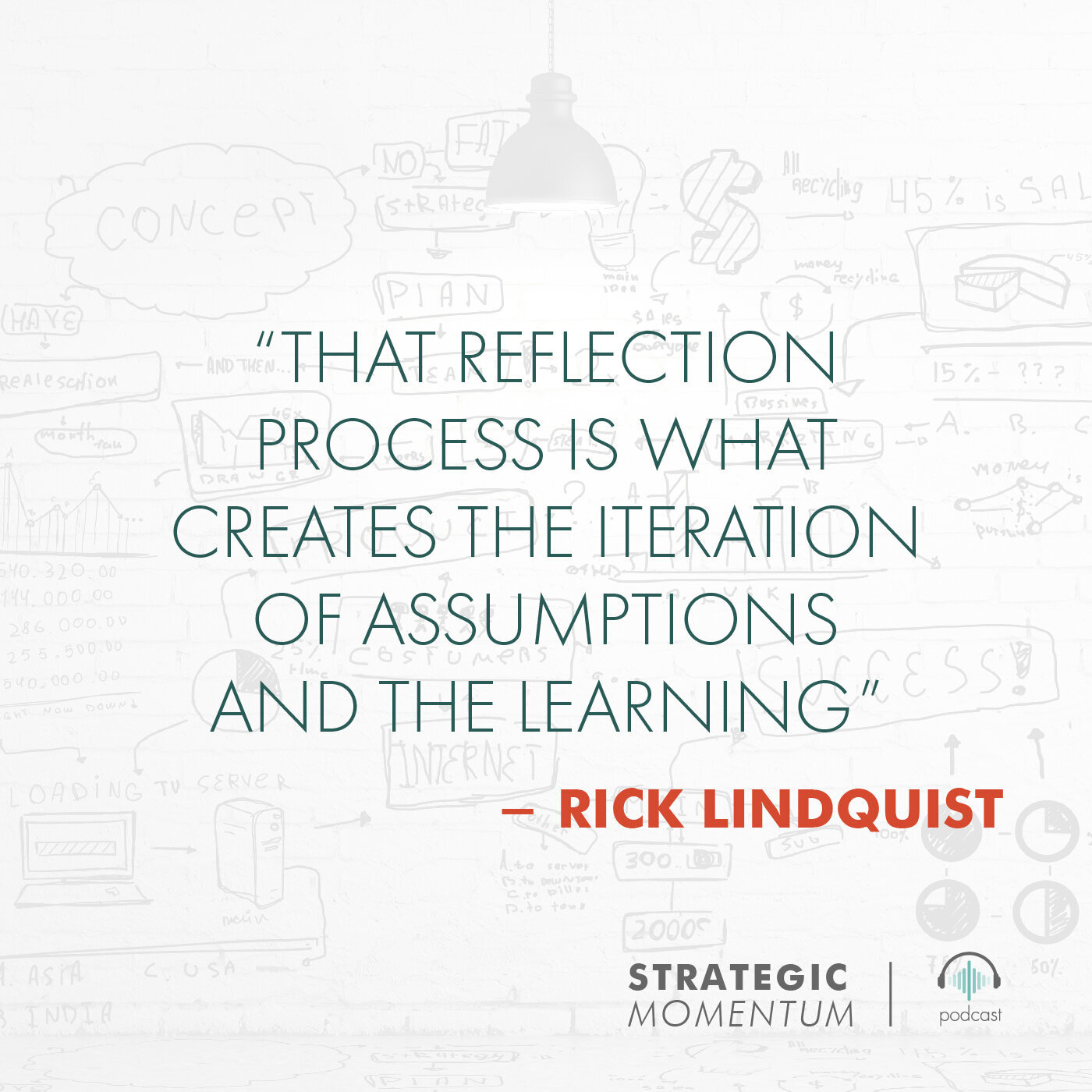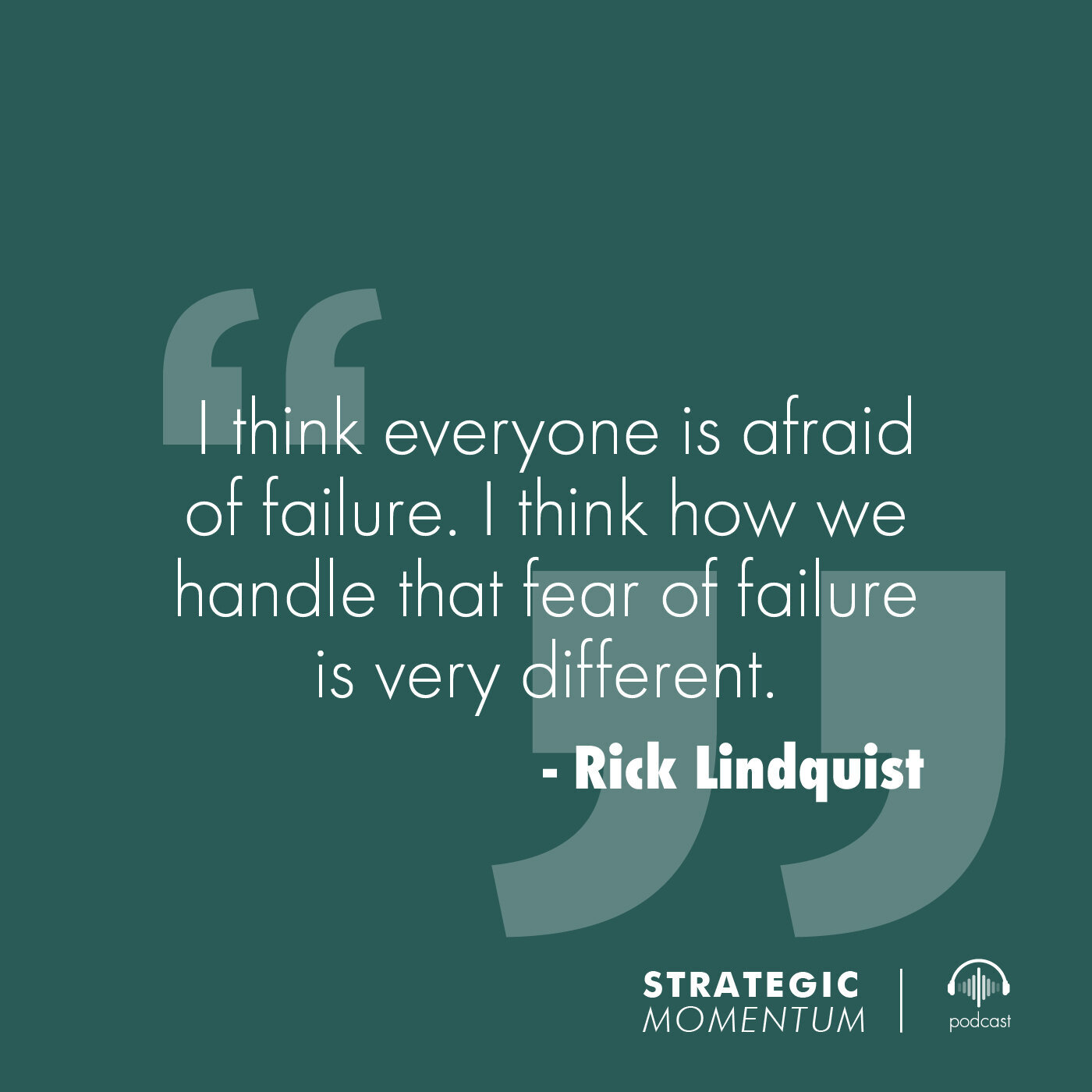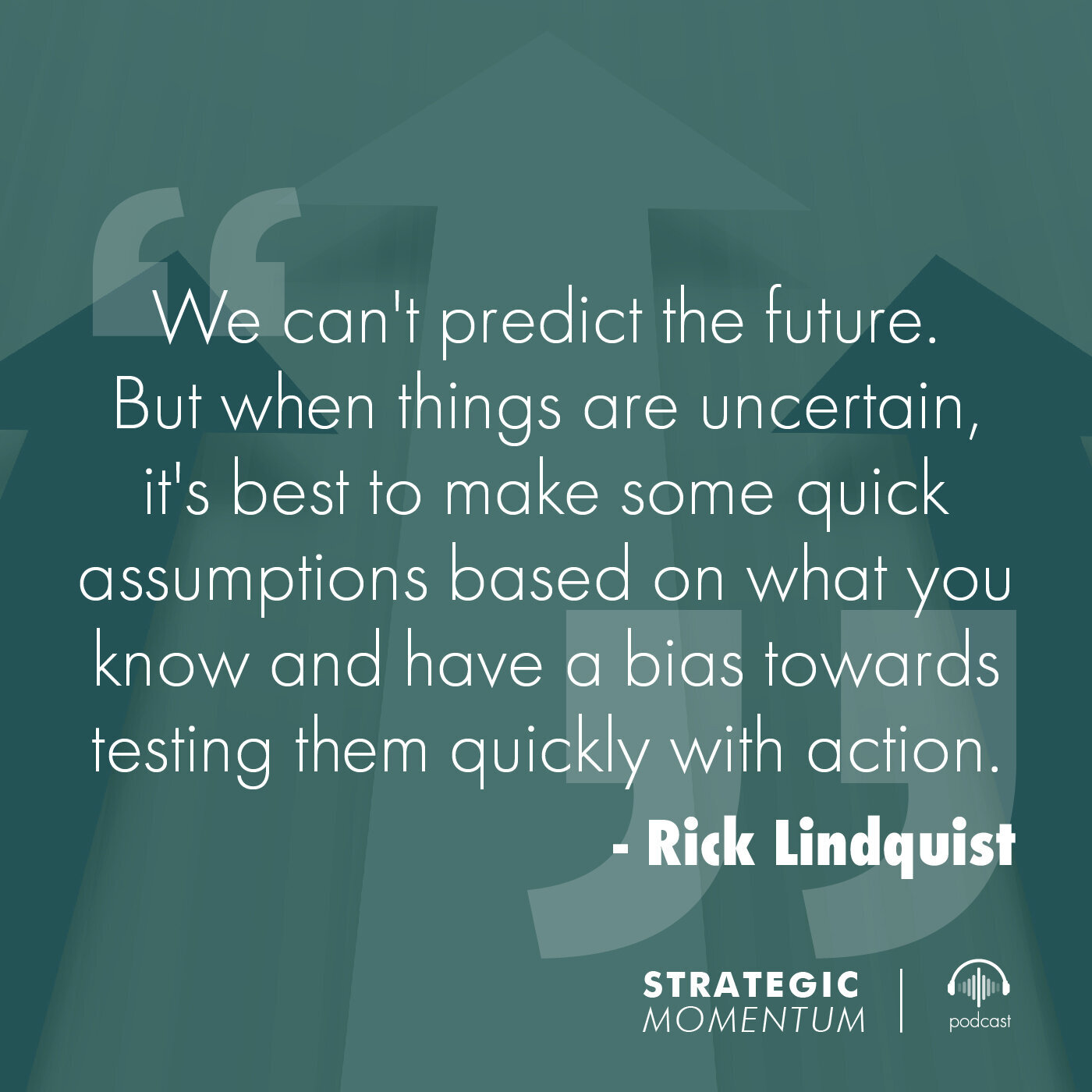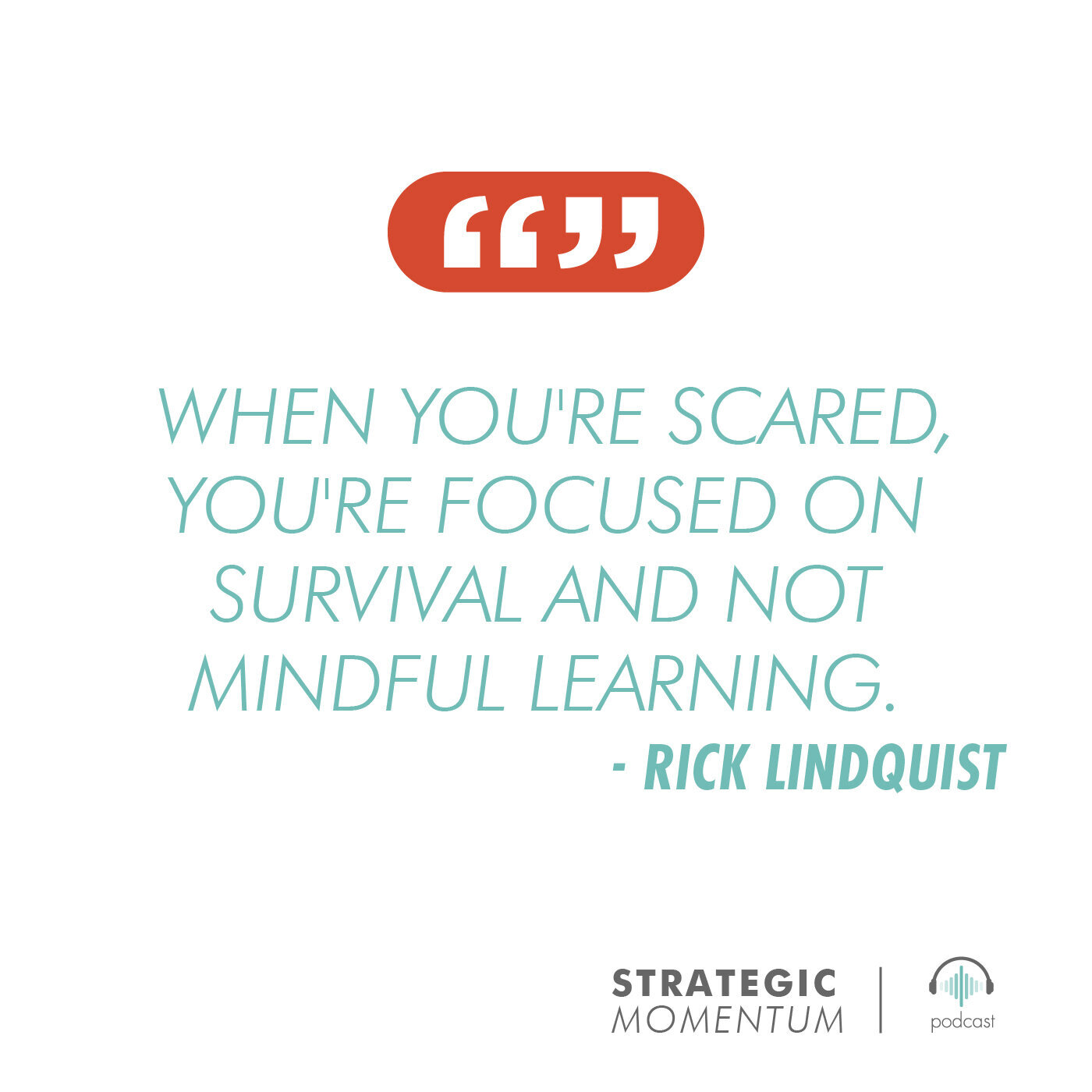Ep. 66 - Fail Fast, Learn Faster: Creating a Safe Environment to Fail to Propel You and Your Business Forward
Find Us Wherever You Listen To Podcasts
“Fail fast, fail often” is a common business concept that many apply (or desire to) in order to drive growth for their organization.
While this mindset and approach is something that many say they embrace, it isn’t always fully realized in a way that builds the right forward momentum. So what does it take to create an environment where failure isn’t feared but rather is used as a building block for mindful learning - for you and your organization?
Rick Lindquist is the founder of LegUp Ventures and former CEO of Zane Benefits now People Keep. Rick was put at the helm of the company at the ripe of old age of 22 and spent the next 10 years quickly learning, iterating and growing in his role. From the highs and lows of that experience, he has gained a deep appreciation of the importance of learning from failure.
Now in his mid thirties and in the next phase of his career, he is focused on using what he has learned to help underdogs get a leg up, as an entrepreneur, author and consultant.
In this episode Rick shares:
What ‘Fail Fast. Fail Often.’ really means when it comes to creating that positive approach for you and your organization
How to create an environment that makes it safe to fail professionally and personally
The importance of intentional self-reflection to truly see the potential lessons learned and grow from it
Unexpectedly Finding Passion and Purpose in an Ever-Changing Corporate World
Rick was reluctant to enter the ‘real world’ after graduating from Duke University, in part because of his father’s lack of fulfillment towards his own work. Since his father didn’t love his profession (a lawyer), Rick assumed he would hate working too. So he decided to take a year off to be a ski bum in Park City, Utah where he worked as a bellman and carpet cleaner.
It was here that a chance encounter with Paul Zane Pilzer, a well-known American economist, New York Times best selling author and successful social entrepreneur, would change his career trajectory for life.
Paul had just launched a new business called Zane Benefits that took a disruptive approach to providing health insurance for employees. Their solution was for employees to buy their own insurance, so that it became personal and portable, which the company would then reimburse. He had raised $3 million which was completely unheard of at the time in Park City given the business community’s primary focus on tourism.
And after reading one of Paul’s most recent books called The New Health Insurance Solution, Rick was completely fascinated by the problem Paul was looking to solve. In fact, little did he know, he had found his passion and purpose.
Rick interviewed with Paul’s company and landed his first professional job as an entry level sales representative. However, unknown to him, by the time he started the role a few months later in December. 2007, Paul had been removed as CEO. And while Paul was still Chairman, Rick would be working under a new management team.
Yet even with that first experience of unexpected change, Rick adapted quickly and contrary to what he originally thought, he realized he really liked working. He was drawn to the learning and problem solving aspect of it. In fact, it was this addiction to solving complex problems that triggered his desire to seek out compelling work from various executives particularly, given they didn’t have a lot of sales coming in. He was (and still is) a voracious learner.
Seven months later, Rick became one of the leading experts in the country on the approach they were using to make their type of offering possible.
Learning From Failure to Create Rapid Growth
The company faced another turning point less than a year after Rick began at Zane Benefits. When the market crashed in October 2008, everyone was let go except for a handful of junior level employees. With only 6 months of cash left in the bank, Paul left the remaining team members including Rick to devise a plan to change their trajectory or otherwise go into bankruptcy.
Fortunately, Rick and his friend Tyler, a talented engineer, had a potential solution based on a proposal they had worked on a few months earlier. While this plan was rejected by the former executive team, they pitched their idea to Paul of which he gave them the green light and his full support.
With a vision of what they wanted to develop, and a thesis around why they thought it would work, coupled with the backing of their Chairman, they began building, executing and trying everything.
And even though they didn't know exactly how they were going to realize their vision, they had the tenacity to try because they were focused on the learning aspect of it - on the ‘what would happen if’. What Rick didn’t realize at that time was that Paul had effectively created an environment where it was safe to fail and push the envelope.
Rick spearheaded the proposed effort and in three months, the company became cash flow positive. Rick was then given the reigns to run the entire company and grew Zane Benefits from that challenging time to $4 million in revenue by 2014.
Failing Forward When Looking Backward
During that decade-long tenure of running the company, Rick had to learn on the fly how to be an effective leader of the business.
This environment where it was okay to fail also led Rick and his remaining team members to be fearless. But the company also faced adverse situations of which changed the company dynamics that once made it successful.
In Oct. 2018 Rick was asked to resign from Zane Benefits, which was rebranded as People Keep. This forced pivot after 10 years at the company led Rick to go through a lot of self-reflection. It was only after he left the company, and took time to learn from those unhealthy periods in the business and even his own behavior, did he gain clarity on the valuable lessons that have helped him personally and professionally today.
Being Mindful, Acting Quickly, Reflecting and Iterating - In the Right Environment
For Rick, being able to successfully “Fail Fast. Learn Fast” isn’t about failing and just doing it again. Rather it’s about making assumptions, quickly acting and reflecting on them, and then iterating.
It’s this notion of mindful learning with a bias towards immediate action. But you have to set up an environment where it’s safe to fail and that applies not only professionally but personally because everyone is afraid of failure contrary to what they may say. And when you are scared, you're focused on survival not mindful learning. And ultimately how you handle that fear of failure will be different.
Also realize that there are factors that inhibit a culture of learning from failure that may not always be under your control. You then have to build a culture of trust while establishing an operational foundation that can help you manage the inevitable downturns of the business.
To successfully fail fast and learn fast, Rick says it’s important to practice intentional reflection so you can truly see those valuable insights and lessons learned which will help you pivot, adjust and propel you and your business forward.
Rick’s Career Advice:
“Control, profitability, growth”. You don’t worry about profitability until you have control, and you don’t worry about growth until you have profitability.
Swim in small ponds. When you're first starting something, you want to be a big fish in a small pond. It creates safe failure.
Key Takeaways:
“Fail Fast. Fail Often” means having a bias towards action particularly when things are uncertain - make some quick assumptions based on what you know and test them quickly with action.
Quickly act, reflect on it, learn and iterate
The reflection process is what creates the iteration of assumptions and the learning. Without it, it's very difficult to learn from failure, if not impossible. So create a habit to do it because it can be taught and caught.
Learning from failure is a core tenet to operating a successful business and growing personally
Create an environment and situations that make it safe for everyone in the company to fail. This is when they will be able to actually learn from it.
Making it Safe to Fail - As an Individual
Apply these three principles to be more mindful as an individual in your own professional development:
Develop trust in your interpersonal relationships both at work and at home. You can then learn from - and learn with - those close to you.
Create financial security. This is situational but unfortunately is required before you can feel safe to fail.
Practice intentional self reflection weekly to really examine your strategies, actions, and results.
Making it Safe to Fail - For Your Organization/Business
Create a culture of trust as organizationally, it’s the number one inhibitor in failure. Employees should feel like they are valued enough to make choices - and not fear repercussions if these decisions do not bring immediate success.
Establish operational and financial strategies at a foundational level to weather business downturns so it enables you to minimize risk and maximize opportunities.
“Put yourself in a position to weather the bad luck, and then have the choice to take advantage of the good.”








